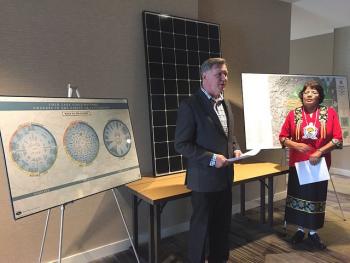Image Caption
Audio
By Shari Narine
Windspeaker Contributor
COLD LAKE FIRST NATIONS, Alta.
Funding from the province will have both an environmental and economic impact on a northeastern First Nation.
On Aug. 28, Indigenous Affairs Minister Richard Feehan was in Cold Lake First Nations to announce a grant of approximately $200,000 through the Alberta Indigenous Solar Program.
It’s welcomed funding, says Chief Bernice Martial, as it meets a number of commitments for the Nation: to help the environment, keep down power costs, and provide jobs.
Cold Lake First Nations is contributing close to $50,000 toward the project.
Solar panels will be erected first on the school and then on the band administration building. Three other buildings, yet to be decided on, will also receive solar panels.
“The power bills, we find that it had increased, so we’re trying to find alternatives so therefore we decided to go solar,” said Martial.
Going solar will save about $6,000 on utility bills each year, saving nearly $150,000 on utilities over the 25-year life of the solar panels. It will also reduce greenhouse gas emissions by more than 1,305 tonnes.
Cold Lake First Nations would consider expanding solar energy to other buildings, including residences, said Martial, depending on how this project goes. Other forms of green energy may also be looked at.
The band could access the Green Employment Program, though Indigenous Relations, which provides funding for training.
“There are a lot of youth in my community, and that’s the population we’re going to try and target (for training),” said Martial. “The idea is to try and get employment for my band.”
Helping First Nations, Métis settlements and Indigenous organizations develop solar energy and other green energy projects, is a good fit for the Alberta government, says Feehan.
“We have a shared value system between the First Nations and the government of Alberta in terms of taking care of the earth, the air and the water and leaving the land to our future generations as a healthy, strong place for them to grow up in and raise the next generation,” he said.
Earlier this summer, Alberta Indigenous Relations announced $35 million through seven different programs that would allow Indigenous communities and organizations to access grant funding for a wide variety of climate change initiatives.
“It’s about developing a green economy and it’s about making sure First Nations people are a part of that green economy right from day one, so that they’re not coming up from behind in the future. They are there, they’ve learned all the skill sets, and they are doing wonderful things,” said Feehan.
While the minister has no exact numbers as to how many First Nations and Métis settlements have taken advantage of the seven different programs, he said, “If I were to say that we’re nearing 100 per cent, I don’t think I’m very far off. Everybody is getting on board with at least some aspect.”
Completing a community audit is the first and least costly stage. From there, said Feehan, many communities have moved on to solar installation as that is a “fairly quick, easy thing to do.”
Feehan says Cold Lake First Nations has shown “some major leadership” with its quick involvement in the Indigenous Solar Program.
Listen: Jeremy Harpe of CFWE-FM interviewed Indigenous Affairs Minister Richard Feehan about the project. His interview below.

